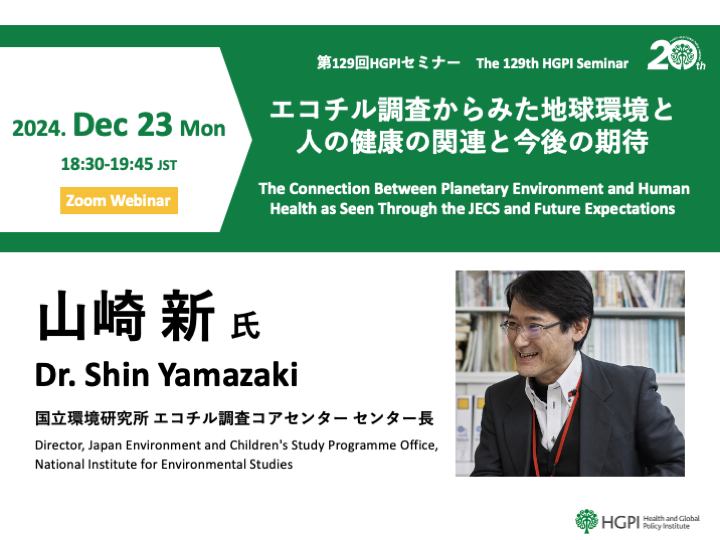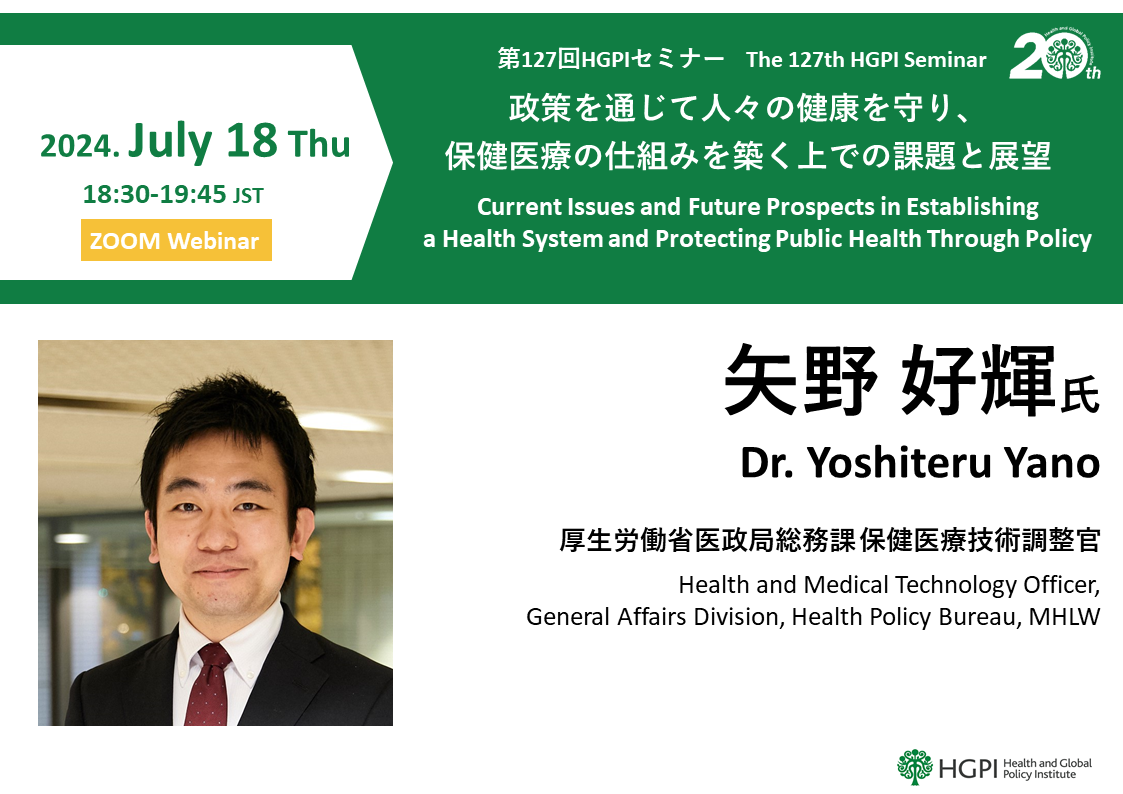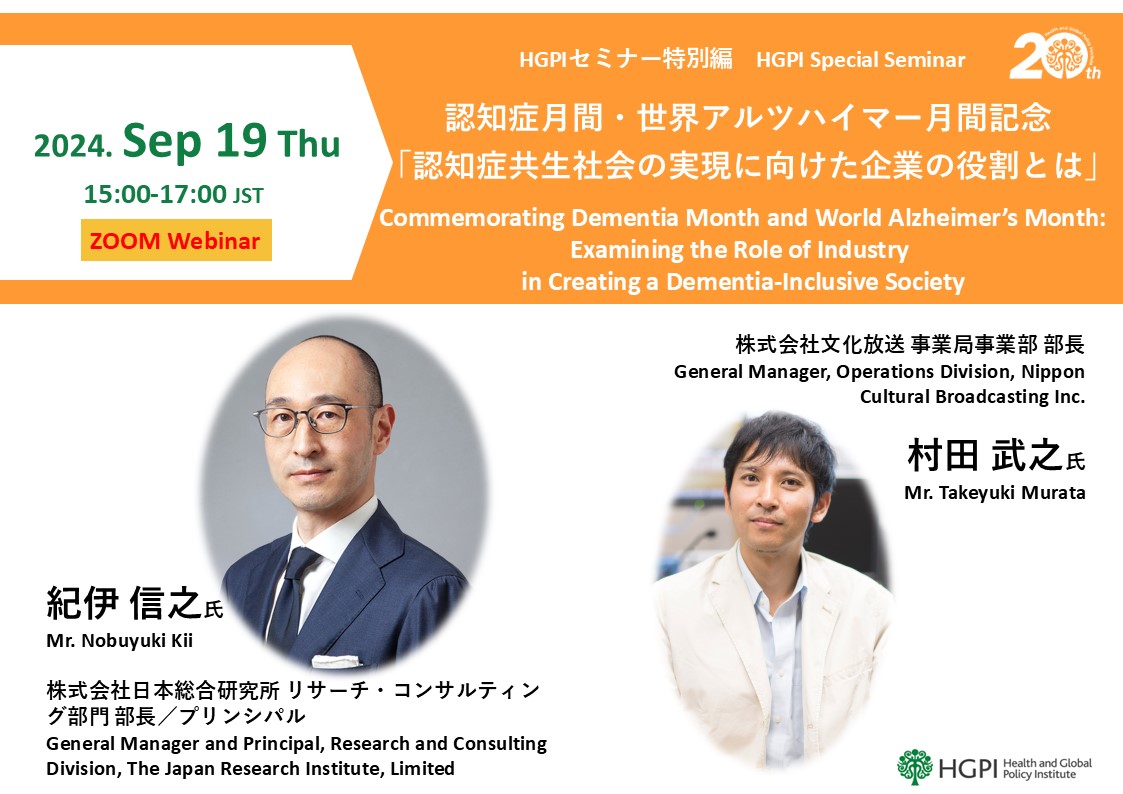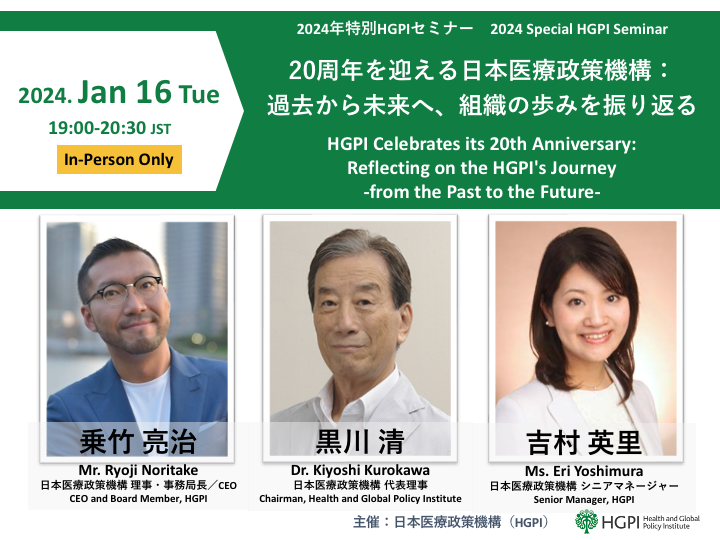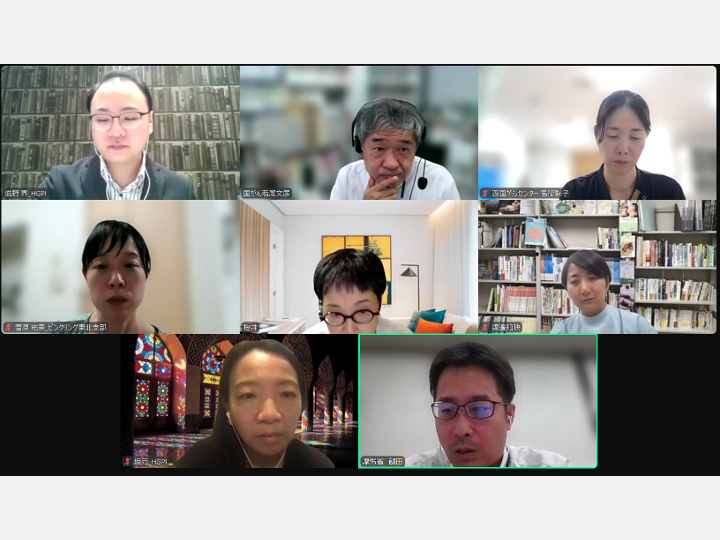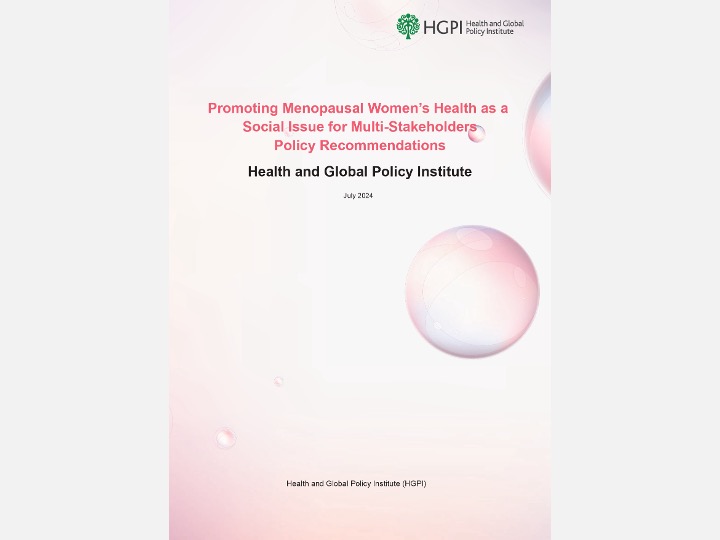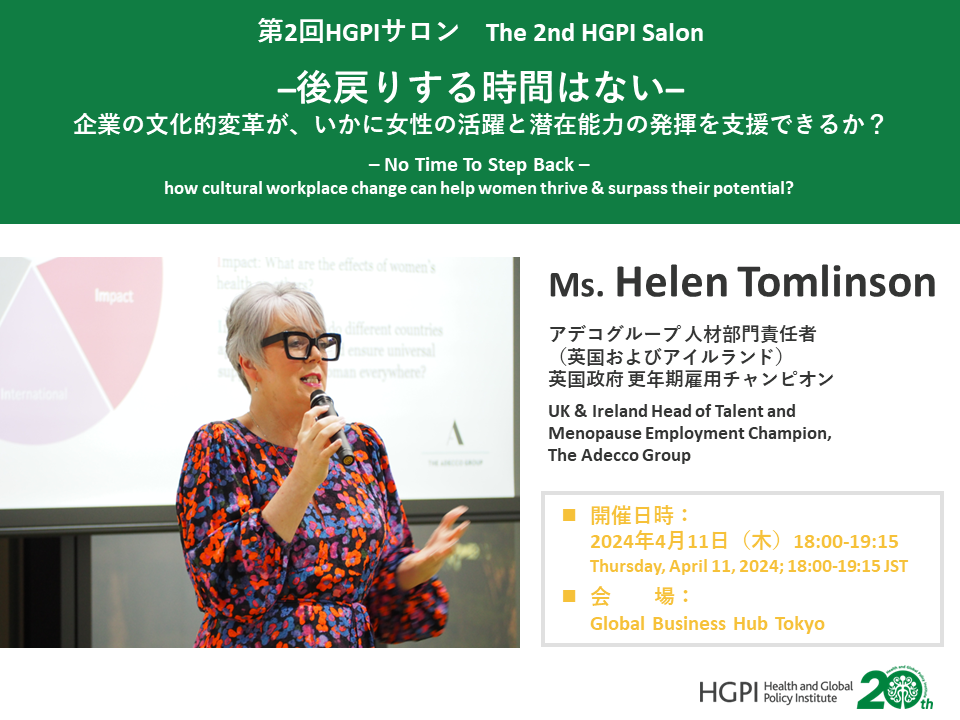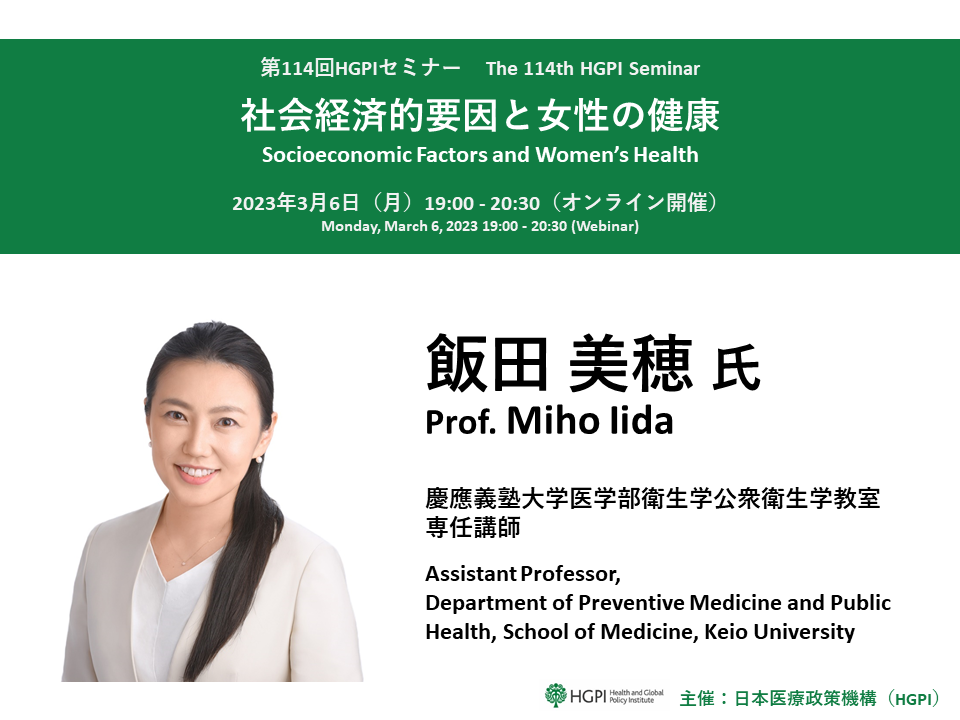[Event Report] The 128th HGPI Seminar “Viewing Healthcare Disparities Through the Lens of Breast Cancer Treatment” (October 29, 2024)
date : 11/27/2024
Tags: Cancer, HGPI Seminar, NCDs
![[Event Report] The 128th HGPI Seminar “Viewing Healthcare Disparities Through the Lens of Breast Cancer Treatment” (October 29, 2024)](https://hgpi.org/en/wp-content/uploads/sites/2/hs128-top-1.png)
To mark Pink Ribbon Month this October, we hosted Dr. Shigehira Saji (MD, PhD., Professor and Chairman, Department of Medical Oncology, Fukushima Medical University School of Medicine) for the 128th HGPI Seminar. To examine healthcare disparities through the lens of breast cancer treatment, Dr. Saji covered topics like circumstances in real-world healthcare settings or the situation in Japan from the perspective of this month for raising breast cancer awareness.
Key points of the lecture
- Breast cancer treatment is classified according to the expression of hormone receptors and Human Epidermal Growth Factor Receptor 2 (HER2). Modern treatments can extend life expectancies, but they also come with longer treatment times and higher drug costs that place greater financial burdens on patients.
- When people undergo long-term treatments, factors that differ among regions such as lifestyles or economic conditions result in disparities in treatment continuity, so it is vital to select the treatments that are optimal for each patient.
- In Japan, Pink Ribbon Month has mostly focused on screening and early detection. Overseas, Pink Ribbon Month also focuses on developing new treatment methods or supporting patients, which are attracting interest from civil society as a whole through fundraising.
- There has been progress in both efforts to consolidate healthcare and achieve healthcare equity in the field of cancer treatment, including in breast cancer. While reflecting on issues such as physician shortages (especially for specialists), realistic consolidation measures that reflect conditions in each community should be considered.
◼︎Efforts are being made to maximize patient outcomes by establishing clinical guidelines for breast cancer treatment, but at the same time, many patients are using expensive new pharmaceuticals for long periods of time. This is resulting in disparities in economic and psychological burdens among patients.
Breast cancer treatments are currently classified in four major categories based on whether or not there is expression of hormone receptors or Human Epidermal Growth Factor Receptor 2 (HER2) in cancer cells, and these categories are used to decide treatments. The guidelines established by the Japanese Breast Cancer Society recommend drug combinations and priorities according to those four categories, and survival times can be extended significantly if the latest guidelines are used to select treatments. This is due to the remarkable progress that has been made in R&D on new drugs in the field of breast cancer. However, these drugs are an order of magnitude more expensive than conventional treatment options. On top of this, advanced or recurrent breast cancer cannot be treated by administering a drug once; rather, they generally require the administration of what are known as hormone therapeutics or molecular-targeted therapeutics over long periods of time. While these new drugs have made it possible to extend survival times, using them means longer administration periods. This greatly increases total medical expenses borne by patients.
In terms of total health expenditures, the introduction of these new, high-cost drugs and their indication in many patients is having an enormous impact. At the same time, if we think of the need to undergo treatment for long periods from patients’ perspectives, paying for treatments that cost tens of thousands to hundreds of thousands of yen per month results in significant financial burdens, even when these costs are eligible for coverage from the high-cost medical expense benefit system. Additionally, patients’ burdens are not only financial in nature; there are a number of concerns that can impact treatment continuity for individuals. These include changes in life patterns, time or monetary constraints that vary by occupation, or reasons rooted in regional characteristics. People serving in clinical settings are now seeing firsthand how these individual background factors result in disparities in treatment continuity. After recognizing these disparities, we must continuously ask ourselves what the best treatments will be for patients while considering how to maintain Japan’s existing healthcare system, which is based on free access.
◼︎Pink Ribbon Month is a global initiative, but in Japan, breast cancer awareness campaigns and their content are centered around screening. There is too little attention placed on the perspectives of those who already live with breast cancer and their families, or on involving society in considering the collective impact of breast cancer.
Beginning around 2000, October has been recognized in Japan as “Pink Ribbon Month,” which is dedicated to breast cancer control. Events and campaigns are now hosted by various organizations and bodies including companies, patient groups, and administrative bodies in various regions including the Tokyo metropolitan area as well as in other parts of the country. However, in Japan, Pink Ribbon Month mainly focuses on medical examinations and early detection, and there are few awareness-raising activities for other aspects of breast cancer. In fact, the breast cancer control poster awarded the Grand Prix in 2021 was the subject of a great deal of discussion because it was thought to only convey the importance of early detection without any consideration for those who have already developed breast cancer. Some voiced concerns that the campaign did not take support for those who had already developed the condition into account, and would leave them behind.
Overseas, campaigns often use slogans like, “Aim for zero deaths from breast cancer,” and encompass a wide range of themes in addition to early detection, such as improving treatment and patient support. They also include efforts to dispel the negative image surrounding breast cancer, such as those aiming to establish a more positive image among the general public. There are also initiatives to raise funds for research through Pink Ribbon campaigns. As we can see, overseas, Pink Ribbon Month has become a time for all of civil society to take an interest and participate in raising breast cancer awareness. In Japan, it will be important to continue campaigning with an eye on involvement from community members and actions that must be taken to eliminate breast cancer.
◼︎We cannot change the total number of physicians in Japan overnight, but we should examine realistic options for consolidating health services that are tailored to conditions in each community to correct disparities in access to breast cancer treatment specialists.
The three main methods of treating cancer are surgery, radiation therapy, and pharmacotherapy. While it is immediately apparent that the first two methods are the purview of specialists, a final decision as to which department should take the lead in pharmacotherapy has yet to be reached. There is a department that utilizes expertise in pharmacotherapy to advance treatment called medical oncology, but there are lingering issues related to the nationwide popularization and adoption of such practices.
The Japan Medical Association also recognizes medical oncology as a department, and it was categorized as a subspecialty in internal medicine when the new medical specialist system was implemented in FY2020. There are currently around 1,700 registered specialists in this area. However, that figure corresponds to the entire field of oncology. In the area of breast cancer, only about 5% of medical oncologists specialize in the breast gland. The system has been designed in a way that makes it difficult for physicians to specialize in breast cancer even during the process of selecting a medical specialty.
Given these circumstances, in an area with many patients like breast cancer, despite intentions to achieve equity, it is unrealistic to divide the roles of surgical treatment, radiotherapy, and pharmacotherapy and provide pharmacotherapy in a uniform manner throughout the country. This is because pharmacotherapy must be provided in a manner that corresponds to background factors for patients. The goal of Japan’s universal health insurance system is to ensure citizens can access the same quality of healthcare anywhere in the country. However, in the area of breast cancer, rather than only focusing on achieving equity in the treatment environment, it will also be necessary to hold discussions to consider realistic consolidation methods for each role in the future.
The 128th HGPI Seminar provided an overview of the issue of domestic healthcare disparities seen through the lens of the characteristics of breast cancer treatment. A vital aspect of correcting these disparities will be the concept of social capital, in which organizations and groups engage in cross-cutting joint initiatives that have a collective impact while helping each other in times of need to address social issues. To correct healthcare disparities, it will be important to implement initiatives tailored to actual circumstances in communities while taking a broad view of the issue.
[Event Overview]
- Speaker: Dr. Shigehira Saji (MD, PhD. Professor and Chairman, Department of Medical Oncology, Fukushima Medical University School of Medicine)
- Date & Time: Tuesday, October 29, 2024; 18:30-19:45 JST
- Format: Online (Zoom webinar)
- Language: Japanese
- Participation Fee: Free
■Profile
Dr. Shigehira Saji (MD, PhD. Professor and Chairman, Department of Medical Oncology, Fukushima Medical University, School of Medicine)
Dr. Shigehira Saji is currently Professor and Chairman of the Department of Medical Oncology, Fukushima Medical University, School of Medicine. He also has an appointment as Director of Medical Oncology and Clinical Oncology Center of Fukushima Medical University Hospital.
He received MD degree in 1992 and PhD degree in 1999 from his hometown university, Gifu University School of Medicine. After residency at Tokyo Metropolitan Komagome Hospital, he accumulated his basic and clinical research experience at Saitama Cancer Center Research Institute (1998), Karolinska Institute, Sweden (1999-2001) and M.D. Anderson Cancer Center, Texas (2003).
Prior to his current appointment, he was chief physician of Tokyo Metropolitan Komagome Hospital (2001-2009), associate professor of Saitama Medical University (2009-2011) and of Kyoto University Graduate School of Medicine (2011-2014).
His main areas of research include basic biology of hormone dependent breast cancer and translational/clinical research related to endocrine therapy and immune therapy. He conducted several research projects and published numerous papers in this field. He is a steering committee member of several global phase-III studies. He is involved in running of large clinical study groups such as JCOG (Japan Clinical Oncology Group) and JBCRG (Japan Breast Cancer Research Group), and serves as executive board member of JBCS (Japanese Breast Cancer Society), JSMO (Japanese Society of Medical Oncology) and BIG (Breast International Group). He is also a Steering Committee member of EBCTCG (Early Breast Cancer Trialists’ Collaborative Group). He enjoys several tough sports such as ultramarathon around 70-120km, climbing the Japan Alps and backcountry skiing.
Top Research & Recommendations Posts
- [Policy Recommendations] The Path to a Sustainable Healthcare System: Three Key Objectives for Public Deliberation (January 22, 2026)
- [Research Report] The 2025 Public Opinion Survey on Healthcare in Japan (March 17, 2025)
- [Research Report] Perceptions, Knowledge, Actions and Perspectives of Healthcare Organizations in Japan in Relation to Climate Change and Health: A Cross-Sectional Study (November 13, 2025)
- [Policy Recommendations] Reshaping Japan’s Immunization Policy for Life Course Coverage and Vaccine Equity: Challenges and Prospects for an Era of Prevention and Health Promotion (April 25, 2025)
- [Research Report] The 2023 Public Opinion Survey on Satisfaction in Healthcare in Japan and Healthcare Applications of Generative AI (January 11, 2024)
- [Research Report] AMR Policy Update #4: Cancer Care and AMR (Part 1)
- [Public Comment Submission] “Assessment Report on Climate Change Impacts in Japan (Draft Overview)” (December 24, 2025)
- [Policy Recommendations] Developing a National Health and Climate Strategy for Japan (June 26, 2024)
- [Research Report] The Public Opinion Survey on Child-Rearing in Modern Japan (Final Report) (March 4, 2022)
- [Research Report] Survey of Japanese Physicians Regarding Climate Change and Health (December 3, 2023)
Featured Posts
-
2026-01-09
[Registration Open] (Hybrid Format) Dementia Project FY2025 Initiative Concluding Symposium “The Future of Dementia Policy Surrounding Families and Others Who Care for People with Dementia” (March 9, 2026)
![[Registration Open] (Hybrid Format) Dementia Project FY2025 Initiative Concluding Symposium “The Future of Dementia Policy Surrounding Families and Others Who Care for People with Dementia” (March 9, 2026)](https://hgpi.org/en/wp-content/uploads/sites/2/dementia-20260309-top.png)
-
2026-02-05
[Registration Open] (Webinar) The 141st HGPI Seminar “Current Status and Future Prospects of Korea’s Obesity Policy: Voices of People with Lived Experience in Policy Promotion” (March 3, 2026)
![[Registration Open] (Webinar) The 141st HGPI Seminar “Current Status and Future Prospects of Korea’s Obesity Policy: Voices of People with Lived Experience in Policy Promotion” (March 3, 2026)](https://hgpi.org/en/wp-content/uploads/sites/2/hs141-top-1.png)
-
2026-02-06
[Research Report] AMR Policy Update #5: Cancer Care and AMR (Part 2)
![[Research Report] AMR Policy Update #5: Cancer Care and AMR (Part 2)](https://hgpi.org/en/wp-content/uploads/sites/2/HGPI_20260204_AMR-Policy-Update-5.png)




